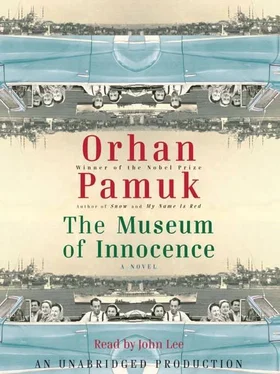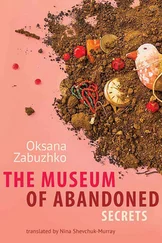The cold seemed to bring the family closer, and after the ceremony was over they wanted to remain together, but I fled them, taking a taxi straight to the Merhamet Apartments. Even the smell of the apartment brought me peace as I inhaled it from the threshold; I knew from experience that Füsun’s lead pencil had the greatest consolatory power of all the things in the apartment, with her teacup, which I had not washed since her disappearance, coming in a close second; I took these things into bed with me. After touching them and stroking my skin with them for a short time, I was able at last to relax.
To readers and museum visitors who are curious to know whether the pain I endured that day was owing to the death of my father or to Füsun’s absence, I would like to say that the pain of love is indivisible. The pains of true love reside at the heart of our existence; they catch hold of our most vulnerable point, rooting themselves deeper than the root of any other pain, and branching to every part of our bodies and our lives. For the hopelessly in love, the pain can be triggered by anything, whether as profound as the death of a father or as mundane as a piece of bad luck, like losing a key; such elemental pain can be flamed by any sort of spark. People whose lives have, like mine, been turned upside down by love can become convinced that all other problems will be resolved once the pain of love is gone, but in ignoring these problems they only allow them to fester.
Sitting in the taxi on the day we buried my father, I was able to think these thoughts clearly, but to my regret I could not act accordingly. The anguish of love had disciplined me-brought me to maturity-but in ruling my mind, it gave me scant latitude to use the reason that maturity had brought me. A man like me, too long captive to a destructive passion, will continue on the course his reason tells him is wrong, even if he knows it will bring him to sorrow; in time, he’ll see only more and more clearly how wrong was his path. In such situations there is an interesting phenomenon rarely remarked upon: Even on our worst days, our reason does not stop speaking to us; even if unequal to the power of our passion, it continues to whisper with merciless candor that our actions will serve no purpose but to heighten our love, and therefore our pain. During the first nine months after I lost Füsun, my reason continued to whisper to me, ever more urgently, giving me the hope that one day it would usurp control of my mind and rescue me. But love mingled with such hope (even the simpler hope that I would one day live without pain) gave me the strength to carry on in the face of my agony, while at the same time prolonging it.
As I lay in the Merhamet Apartments, soothing myself with Füsun’s things (the loss of my father having now merged with the loss of my love in an amalgam of being alone and unloved), I began to understand why Füsun and her family had not come to the funeral. Still I struggled to accept that Aunt Nesibe and her husband, who had always attached such importance to their relations with my mother and the family, had stayed away because of me. For this conclusion meant inexorably that Füsun and her family were determined to escape me forever. The prospect that I might never see her again for the rest of my life was so unbearable that I could not entertain it for long; I needed to find some way to have hope of seeing Füsun in the near future.
48 The Most Important Thing in Life Is to Be Happy
“I HEAR you’re blaming Kenan for Satsat’s going off the rails,” Osman whispered into my ear one evening. He came often to visit our mother in the evenings, sometimes with Berrin and the children, but mostly he came by himself to make a threesome at supper.
“Where did you hear that?”
“I hear things,” said Osman. My mother was in the other room; he gestured in her direction. “You’ve disgraced yourself in society, but at least don’t embarrass yourself at the firm,” he said mercilessly. (This despite the fact that he hated the word “society” as much as I did.) “It’s your fault you lost out on the sheet business,” he added.
“What’s going on, what are you talking about?” said my mother. “Please don’t have another argument!”
“We’re not,” said Osman. “I was just saying how good it is that Kemal’s returned. Don’t you agree, Mother?”
“Oh, yes, my son, it’s wonderful. Whatever anybody says, the most important thing in life is to be happy. This city is full of beautiful girls; we’ll find one who is even kinder and more beautiful, and more understanding. After all, a woman who doesn’t love cats is never going to make a man happy. None of us should waste any more time dwelling on what happened. Just promise me you’ll never go back to living in a hotel.”
“On one condition!” I said, childishly repeating Füsun’s ploy of nine months earlier. “I want to take over my father’s car, and Çetin with it.”
“Fine,” said Osman. “If Çetin is happy with that, then I am, too. But you have to stop messing with Kenan and the new business. I don’t want any more mudslinging.”
“I don’t want you two arguing in front of everyone, ever!” my mother said.
After separating from Sibel, I grew more distant from Nurcihan; and once I distanced myself from her, I began to see much less of Mehmet, who was as ever madly in love with her. Zaim, meanwhile, was spending more time with them, so when he and I met it would be just the two of us, and slowly I removed myself from the group. For a brief time I took to going out with Hilmi the Bastard and Tayfun and a few others who, despite being married, engaged, or as good as engaged, still had a taste for the naughtier side of nightlife, and liked to visit the city’s priciest brothels, or I’d go out with friends who knew which hotel lobbies were favored by the slightly more educated and refined girls that we mockingly called the “coeds;” I was not really looking for fun; what I was hoping for was a cure for my illness, but my love for Füsun had emerged from the shadows to claim my entire body. Although it was amusing to be among friends, I was not able to lose myself and forget my troubles. And so most evenings I stayed at home, sitting next to my mother, a glass of raki in my hand, watching whatever was on the single state-controlled channel.
My mother did just as she’d done when my father was alive: a merciless critique of whatever was on the screen; at least once a night, she would tell me not to drink so much, just as she used to tell my father, and then she would fall asleep in her chair. Fatma Hanım, the maid, and I would then be obliged to whisper about whatever was on television. Unlike the maids who worked for the rich families we saw in Western films, Fatma Hanım did not have a television in her room. For four years now, ever since the broadcasting service had begun and we’d bought our first television set, Fatma Hanım would come into the sitting room every evening to perch tentatively on the bar stool at the far end of the room-by now we had come to think of it as “her chair”-and from this distance she would watch along with us, fiddling with the knot in her scarf at moments of high drama, and sometimes venturing into the conversation. After my father’s death, it fell to her to respond to my mother’s endless monologues, and so lately we’d been hearing more from her. One night, after my mother had dozed off, there was a live broadcast of a skating competition; as we watched the long-legged Soviets and Norwegians, just as ignorant of the competition rules as the rest of Turkey, Fatma Hanım and I chatted about the warm weather, the political street killings, my mother’s health, the futility of politics, and about her son, who, after working with my father, had immigrated to Duisburg, Germany, to open a döner restaurant-in other words, we were talking about the sweetness of life, when she brought the subject round to me.
Читать дальше












